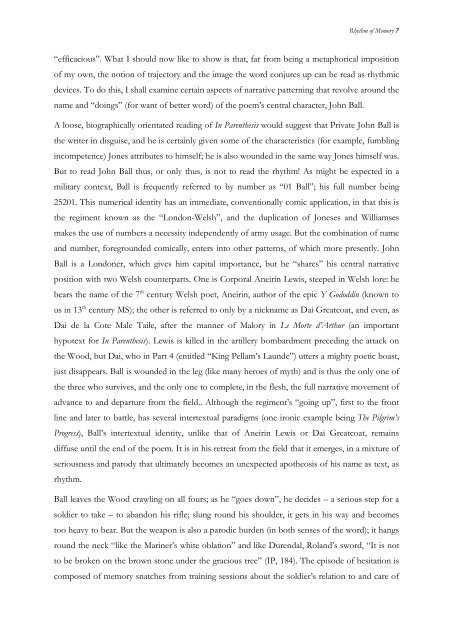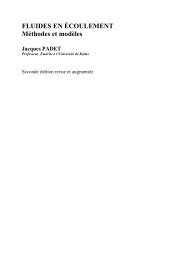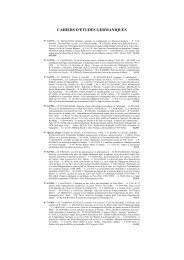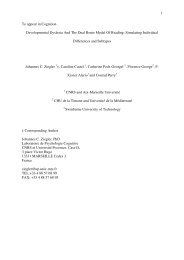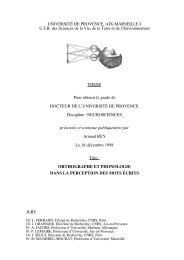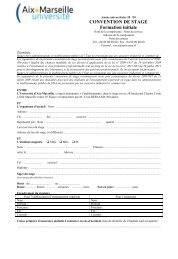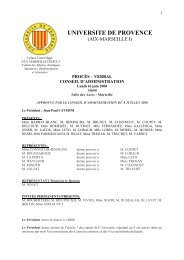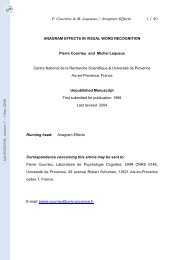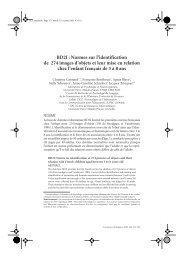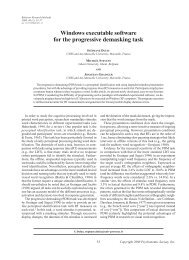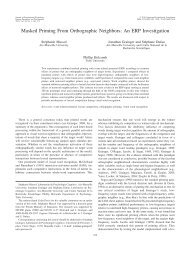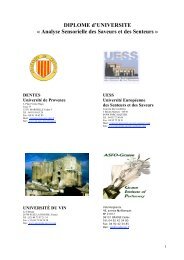The rhythm of memory: a reading of poetic rhythm in David Jones's ...
The rhythm of memory: a reading of poetic rhythm in David Jones's ...
The rhythm of memory: a reading of poetic rhythm in David Jones's ...
- No tags were found...
Create successful ePaper yourself
Turn your PDF publications into a flip-book with our unique Google optimized e-Paper software.
Rhythm <strong>of</strong> Memory 7“efficacious”. What I should now like to show is that, far from be<strong>in</strong>g a metaphorical imposition<strong>of</strong> my own, the notion <strong>of</strong> trajectory and the image the word conjures up can be read as <strong>rhythm</strong>icdevices. To do this, I shall exam<strong>in</strong>e certa<strong>in</strong> aspects <strong>of</strong> narrative pattern<strong>in</strong>g that revolve around thename and “do<strong>in</strong>gs” (for want <strong>of</strong> better word) <strong>of</strong> the poem’s central character, John Ball.A loose, biographically orientated <strong>read<strong>in</strong>g</strong> <strong>of</strong> In Parenthesis would suggest that Private John Ball isthe writer <strong>in</strong> disguise, and he is certa<strong>in</strong>ly given some <strong>of</strong> the characteristics (for example, fumbl<strong>in</strong>g<strong>in</strong>competence) Jones attributes to himself; he is also wounded <strong>in</strong> the same way Jones himself was.But to read John Ball thus, or only thus, is not to read the <strong>rhythm</strong>! As might be expected <strong>in</strong> amilitary context, Ball is frequently referred to by number as “01 Ball”; his full number be<strong>in</strong>g25201. This numerical identity has an immediate, conventionally comic application, <strong>in</strong> that this isthe regiment known as the “London-Welsh”, and the duplication <strong>of</strong> Joneses and Williamsesmakes the use <strong>of</strong> numbers a necessity <strong>in</strong>dependently <strong>of</strong> army usage. But the comb<strong>in</strong>ation <strong>of</strong> nameand number, foregrounded comically, enters <strong>in</strong>to other patterns, <strong>of</strong> which more presently. JohnBall is a Londoner, which gives him capital importance, but he “shares” his central narrativeposition with two Welsh counterparts. One is Corporal Aneir<strong>in</strong> Lewis, steeped <strong>in</strong> Welsh lore: hebears the name <strong>of</strong> the 7 th century Welsh poet, Aneir<strong>in</strong>, author <strong>of</strong> the epic Y Gododd<strong>in</strong> (known tous <strong>in</strong> 13 th century MS); the other is referred to only by a nickname as Dai Greatcoat, and even, asDai de la Cote Male Taile, after the manner <strong>of</strong> Malory <strong>in</strong> Le Morte d’Arthur (an importanthypotext for In Parenthesis). Lewis is killed <strong>in</strong> the artillery bombardment preced<strong>in</strong>g the attack onthe Wood, but Dai, who <strong>in</strong> Part 4 (entitled “K<strong>in</strong>g Pellam’s Launde”) utters a mighty <strong>poetic</strong> boast,just disappears. Ball is wounded <strong>in</strong> the leg (like many heroes <strong>of</strong> myth) and is thus the only one <strong>of</strong>the three who survives, and the only one to complete, <strong>in</strong> the flesh, the full narrative movement <strong>of</strong>advance to and departure from the field.. Although the regiment’s “go<strong>in</strong>g up”, first to the frontl<strong>in</strong>e and later to battle, has several <strong>in</strong>tertextual paradigms (one ironic example be<strong>in</strong>g <strong>The</strong> Pilgrim’sProgress), Ball’s <strong>in</strong>tertextual identity, unlike that <strong>of</strong> Aneir<strong>in</strong> Lewis or Dai Greatcoat, rema<strong>in</strong>sdiffuse until the end <strong>of</strong> the poem. It is <strong>in</strong> his retreat from the field that it emerges, <strong>in</strong> a mixture <strong>of</strong>seriousness and parody that ultimately becomes an unexpected apotheosis <strong>of</strong> his name as text, as<strong>rhythm</strong>.Ball leaves the Wood crawl<strong>in</strong>g on all fours; as he “goes down”, he decides – a serious step for asoldier to take – to abandon his rifle; slung round his shoulder, it gets <strong>in</strong> his way and becomestoo heavy to bear. But the weapon is also a parodic burden (<strong>in</strong> both senses <strong>of</strong> the word); it hangsround the neck “like the Mar<strong>in</strong>er’s white oblation” and like Durendal, Roland’s sword, “It is notto be broken on the brown stone under the gracious tree” (IP, 184). <strong>The</strong> episode <strong>of</strong> hesitation iscomposed <strong>of</strong> <strong>memory</strong> snatches from tra<strong>in</strong><strong>in</strong>g sessions about the soldier’s relation to and care <strong>of</strong>


